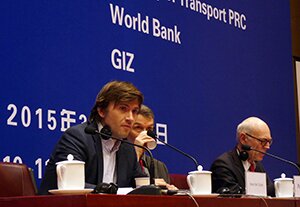 Day two of the Urban Transport Development Forum in Beijing was dedicated to the discussion around parking management policies and practices. The two day forum on March 10-11 2015 was organised by the Chinese Ministry of Transport with support of the World Bank and GIZ. All presentations from the workshop can be downloaded following the links at the bottom of the article.
Day two of the Urban Transport Development Forum in Beijing was dedicated to the discussion around parking management policies and practices. The two day forum on March 10-11 2015 was organised by the Chinese Ministry of Transport with support of the World Bank and GIZ. All presentations from the workshop can be downloaded following the links at the bottom of the article.
Paul Barter, Professor for Public Policy at the Singapore University discussed the pricing, enforcement and zoning of on street parking management. To be effective, parking management policies should achieve an adequate saturation level and not concentrate on revenue making. The price level should be set at a level to achieve an occupancy rate of about 70-90% at all times. Thereby, searching for parking traffic can be reduced which reduces congestion and improves road safety for car drivers but more importantly for pedestrians and cyclist.
30% of peak hour traffic in Berlin is caused by searching for parking traffic. Therefore, Dr. Friedemann Kunst, former Director of Transport of the Berlin Senate, argues that “Parking management can be a controversial but at the same time tremendously effective transport demand management policy”. Considering that vehicles in Berlin are parked 80-90% of the time, parking management is an inevitable measure within the urban transport toolbox. In Berlin, it has led to a 10% reduction in parking demand in the managed area. Adequate pricing increases turnover and reduces the occupancy rate.
In Beijing the problem is more severe as Guo Jifu Director of the Beijing Transportation Research Centre (BTRC) presented. Parking management has so far failed to effectively reduce traffic volume considering that 83% of all car trips end up on a free parking lot. Guo Jifu highlighted that the current excessive illegal use of public spaces for parking through a relatively small proportion of car drivers represents a highly unfair allocation of urban space. To date, too many institutions in Beijing are involved in parking management which makes decision making as well as policy implementation difficult. The lack of effective parking legislation needs attention by the highest political level in the city. However, the challenging magnitude of the current situation should not stop government from starting somewhere. In that respect he recommends to start with a pilot system in Beijing where parking pricing and enforcement is effectively managed. Only then the advantages of parking management can and should be communicated.
Xue Bo of the Shenzhen Metropolitan Transportation Planning and Design Institute explained how Shenzhen was able to transform the utilisation of public spaces through its introduction of parking management. The local government concentrated on enforcement, but also introduced parking zones, higher fees and a parking guide system. A key to success was the application of modern technology in parking management. It makes enforcement more effective, provides less opportunities for corruption and delivers valuable data.
Bram von Ooijen (ITDP) persuasively stressed that creating more parking supply will create a vicious circle resulting in even higher demand for private vehicle trips and consequently to even more demand for parking. Considering that most off-street parking in Beijing remains highly underused solutions to the problem are to be found in managing the existing demand instead of increasing supply. He stressed that a combination of appropriate zoning and the use of modern technologies, not only for monitoring cars, but also to monitor the work of the enforcement staff, can achieve a better usage of public spaces and generate revenues that can the reinvested in public transport.
Download presentations here:
Paul Barter: Take On-Street Parking Management Seriously
Dr. Friedemann Kunst: Parking Policy and Management Experiences
Guo Jifu: Parking Management in Beijing
Xue Bo: Parking Policy in Shenzen
Bram van Ooijen: Experiences on Parking Management in China


